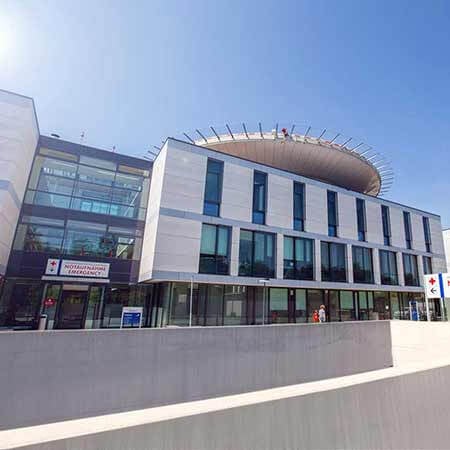Hereditary spherocytosis (microspherocytosis, Minkowski-Chauffard syndrome) is a congenital defect in the erythrocyte membrane. As a result, they are deformed and constantly destroyed in the spleen. Red blood cells are produced in normal numbers but live an average of 2 weeks instead of the usual 3 months. The disease is manifested by jaundice, the formation of gallstones, and an enlarged spleen. You can undergo your treatment of spherocytosis in Germany to get good and long-term results.
Content
- Treatment principles
- Splenectomy
- Cholecystectomy
- Why is it worth undergoing treatment abroad?
Doctors use erythropoietin, folic acid medications, and red blood cell transfusions. In severe spherocytosis, spleen removal may be indicated. Many patients also require gallbladder removal surgery.
You can undergo your treatment in one of the following hospitals: University Hospital Mannheim, University Hospital Ulm, or University Hospital Freiburg.
You will not have to make your own arrangements because Booking Health will organize your trip. The company's specialists will recommend a clinic and a doctor, make a treatment appointment for the nearest date, help you to apply for a visa and come to the clinic, provide interpreting services, take care of the translation of medical records, and help you to buy medicines for maintenance treatment in your home country. You can contact the Booking Health company with any questions.
Treatment principles
It is impossible to cure spherocytosis once and for all. The main goals of treatment are to maintain normal hemoglobin levels in the blood and prevent complications. German hospitals offer conservative and surgical treatment.
In children, hemoglobin is maintained at 7-8 g/dl. In its strong decrease, a blood transfusion or an erythrocyte mass transfusion is performed.
In Germany, patients are often treated with erythropoietin. This stimulates the maturation of red blood cells in the bone marrow and reduces the need for blood transfusions. Patients are also prescribed folic acid medications, as this substance is intensively consumed in the process of cell production.
To get a good and long-term result, patients have their spleen removed. Since red blood cells are destroyed in this organ, the blood cells live longer after surgery. This usually solves the problem of anemia, but increases the risk of infection.
Splenectomy
A splenectomy is the main surgery for spherocytosis treatment. However, it can be only done in patients with a severe form of the disease. In moderate manifestations of the disease, which can occur without jaundice and even without anemia, a splenectomy is not required, since this can do more harm than good to health.
If a splenectomy is required, then it can be done in Germany with a minimally invasive laparoscopic method. The operation is performed through three short incisions: two on the abdomen and one on the side. A fourth incision may also be required if it is necessary to simultaneously remove the gallbladder.
The surgical intervention is performed without immersing the surgeon's hands into the wound and with thin, long instruments. A doctor examines the abdomen, assessing the size of the spleen and the presence of adhesions. The physician then mobilizes and removes the spleen. A vascular pedicle is crossed with a linear stapler. The blood vessels are coagulated. The spleen is extracted in an endoscopic sac. If it is large, the organ is removed in parts. Even to remove the largest spleen, doctors only need an incision of a maximum of 1.5 cm in the navel.
Cholecystectomy
Due to the constant breakdown of red blood cells, a great amount of bilirubin enters the bloodstream. This is excreted through bile, which thickens it, and as a result, bilirubin stones are formed.
The presence of gallstones leads to the development of biliary colic. Each attack can end in acute cholecystitis. In addition, the gallbladder filled with stones loses its function. Therefore, many patients with microspherocytosis have to undergo cholecystectomy, an operation to remove the gallbladder. This operation can be performed:
- on an elective basis, if the stones are large and the gallbladder is no longer functioning;
- on an emergency basis, if acute cholecystitis has developed due to the block of the duct by a stone;
- simultaneously with a splenectomy.
Cholecystectomy in Germany is also performed using a laparoscopic technique. In about one out of three cases, doctors perform surgery to remove the spleen and remove the gallbladder at the same time.
Why is it worth undergoing treatment abroad?
You can undergo your spherocytosis treatment in one of the Hematology Centers in Germany. Doctors will diagnose and find out how severe the disease is, whether bilirubin levels in the blood are elevated, whether there are stones in the gallbladder, whether the spleen is enlarged, whether anemia has developed, and its severity.
Hematologists will carry out treatment with drugs that stimulate the maturation of blood cells. They will perform a blood transfusion, if necessary. If the disease is severe, the help of surgeons will be required.
There are a few reasons for you to undergo your treatment of spherocytosis in Germany:
- high-precision diagnostics;
- modern drug therapy regimens;
- safe treatment at any age, including in newborns;
- minimally invasive laparoscopic surgery to remove the spleen;
- simultaneous gallbladder removal in the case of gallstone disease (one operation instead of two) can be performed;
- doctors examine the abdominal cavity during the operation; should concomitant diseases be detected, these will also be eliminated (in some patients, doctors perform deep inguinal ring plastic surgery, ovarian cyst removal, etc.).
Minimally invasive treatment can reduce the rehabilitation period and a hospital stay, and improve aesthetic results.
On the Booking Health website, you can find out how much the treatment costs and make your treatment appointment abroad at the best price. Our experts will help you to select the most suitable clinics in Germany and arrange your trip.
Authors:
The article was edited by medical experts, board-certified doctors Dr. Nadezhda Ivanisova and Dr. Vadim Zhiliuk. For the treatment of the conditions referred to in the article, you must consult a doctor; the information in the article is not intended for self-medication!
Sources:
National Library of Medicine
Verywell Health
Science Direct










